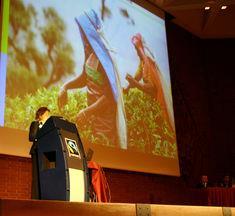
UK retailers and fresh produce businesses came together at the Fairtrade Foundation’s autumn conference to kick off the countdown to Fairtrade Fortnight 2008.
More than 120 representatives from companies including retailers The Co-op, Marks & Spencer, Sainsbury’s, Waitrose, Asda, as well fresh produce suppliers Capespan, Chingfords and Malet Azoulay attended the industry-wide event.
The 13th annual campaign will start on February 25 and the ongoing theme for the fortnight - Change Today. Choose Fairtrade - will be reinforced throughout the 2008 event.
UK Fairtrade sales topped £290 million in 2006 and have been running at annual growth rates of 40 per cent over the past five years.
More than 3,000 products now feature the Fairtrade mark.
Fairtrade Fortnight 2007 saw retail sales of products carrying the Fairtrade mark nearly double over the two-week period, according to AC Nielson data, and both Sainsbury’s and Waitrose announced a 100 per cent switch to Fairtrade bananas.
The event saw public recognition of the Fairtrade mark reach 57 per cent, according to TNS, making it one of the most recognised consumer labels in the UK.
A more direct call for UK consumers to make simple changes in their shopping decisions in order to change the lives of disadvantaged producers in the developing world is planned for the 2008 campaign.
Mark Varney, Fairtrade Foundation business development manager, said: “Businesses often tell us that both their sales and positive customer feedback increase when they switch to Fairtrade. With the hugely heightened awareness and uplift in sales around Fairtrade Fortnight, it is the perfect time for companies to improve visibility and implement point-of-sale around Fairtrade, or consider extending their range of Fairtrade certified products - particularly in this climate of intense consumer interest in the origins of their shopping.”
Gareth Thomas, minister for trade, development and consumer affairs, who spoke at the event, said: “Fairtrade allows people in the UK to make a difference to the lives of poor farmers and producers all over the world, thanks to corporate will and customer demand. Trade - including buying ethical products - has the potential to lift millions of people out of poverty by creating jobs and incomes to pay for food and medicine for families.”



